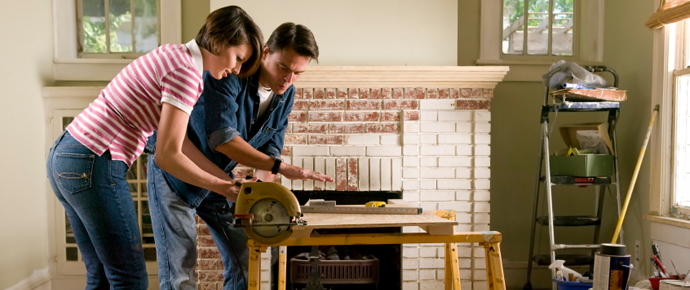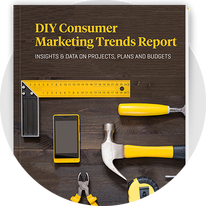
Why Your Brand Needs to Care About DIY Consumers

It’s no secret that the home improvement industry is growing. The market is expected to reach $716.2 Billion by 2015, and is fueled by the consumer’s desire to upgrade their home and personalize their living space.
The DIY Consumer demographic includes a wide rage of consumers from millennials to baby boomers, men to women, singles and married, and even some who rent houses instead of own them.
Check out my blog post on the 10 Characteristics of the DIY Consumer, or this awesome infographic for more stats on the DIY Consumer.
DIYers will Pay More for Quality Products
There is a stigma that DIYers are driven mostly on the idea of saving money. This is simply not true.
A Consumer Survey done by Google shows that only 38% of DIYers are actually trying to save money. The majority of DIYers care more about quality than price.
Because they are investing so much time and energy into a project, they want to be assured that the products they are using will last.
To draw in the DIY Consumer, focus on showcasing your product’s features and benefits over price. Highlight the aspects that make your product more valuable than your competitors.
Consumers are willing to pay more if your product performs better, lasts longer and especially if it is eco-friendly.
DIYers Want to Buy from Brands with Online Resources
It is easier than ever to find information about your products and brand online. Online reviews, social media buzz, videos and pictures are all being shared about your products everyday. It is crucial for you to have a pulse on what customers are saying about your brand.
A powerful, positive online presence is expected, and it’s key to the success of your brand.
But DIYers are looking for more than just reviews, they are looking for you to be an online resource for their newest projects. Lead the conversation by providing interactive training materials, videos, and other resources that will help reinforce that you care about the experience someone will have when using your product.
If someone has a difficult time finding information about your products, they are going to assume that using your product will also be difficult.
Take steps to avoid confusion by creating resources that will show how easy it is to use your product, which will position your brand as easy to use, higher-end, and reliable.
DIYers Give You Direct Connection to the Home Owner
DIY projects put the power in the hands of the homeowner to choose the products, the projects and the timing.
This means the power is in your hands to set up the right kind of marketing strategy to get the DIYers interested in your products. If you’re a company that typically targets large contractors, you’re missing out on a multi-Billion Dollar industry annually.
DIYers Want to be Loyal to Your Brand
Brand Loyalty is key among DIYers. They want to purchase from brands they believe in, and that seem to uphold the same values as they do.
DIY Consumers tend to develop brand loyalty with companies that clearly show how purchasing a product is helping those in need or raising awareness of other’s needs.
Consumers are looking for brands that fit within their beliefs, not just their wallets. If your brand cares about being green, producing sustainable products or giving back to charitable organizations, this should be written all over your website, packaging, and marketing materials.
Take Starbucks for example. They publicize how they are helping the environment by reducing waste on their cups. In addition to their eco-friendly efforts, they have ethical purchasing practices and give back to local communities.
Even though Starbucks is a huge organization, this helps to reinforce that they aren’t profit mongers, and actually care about helping others outside their organization.
Show DIY Consumers why you’re worthy of their brand loyalty by singing the good traits about your products, and what your brand is doing to help the world we live in.
DIYers Still Want to Shop in Stores
A recent study by Mintel shows that 82% of home improvement shoppers want to browse and shop in stores. Even though the popularity of online shopping continues to grow every year, the DIY Consumer, like most people actually, want to see, feel and touch the products they are buying.
DIYers are often purchasing products they are unfamiliar with, so they are drawn to the brick-and-mortar locations to see the products, compare them and get a feel for what they are purchasing before making a decision.
DIYers also want to speak with experts in your store, and ask them about the products. A knowledgeable staff and positive in-store experience is just as important to building brand loyalty with DIYers as is your online presence.
This is especially true for older DIYers who might not be as versed in online product research methods.
DIYers Will Share About Your Product
The emotional investment that DIYers have to their purchase increases their likelihood of posting about your products and your stores in online reviews.
Conclusion
The truth is that today’s modern DIYer is a marketers dream in many respects.
They care about:
- Quality over Price
- Educational Resources
- Brand Loyalty
- Shopping in Stores
- Sharing Good Experiences
The DIYer market segment is only going to grow. Your brand can create long lasting customers who are willing to not only pay more for your product, but who also share their experiences with your company on social media and online reviews.
Make sure you try different tactics and measure them to see what efforts are most effective in reaching this group. Not everything will work, but ensuring the you're paying attention to this consumer group as it grows will pay long term dividends.
So what do you think ... are there any other reasons why someone should care about the DIYer?



